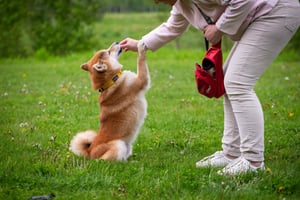Raising a puppy can be overwhelming for many pet owners. A 7 week puppy schedule is a great way to...
An 8-Week Puppy Schedule: Everything You Need to Know
Raising a puppy is an incredibly rewarding experience, but it also requires plenty of preparation. An 8-week puppy schedule is essential for ensuring that your puppy is well-socialised, healthy, and happy. Here, we provide a comprehensive guide to the puppy schedule that you should be following during the first 8 weeks.
Vaccinations and Vet Visits
When you bring your puppy home at 8 weeks old, they may already have had their first set of vaccinations. If they haven’t, you should arrange for your vet to have these done as soon as possible. Thereafter, you should book regular vet visits for the puppy in order to monitor their health and well-being. Generally, puppies need to visit the vet for their booster vaccinations every 3-4 weeks until they reach 16 weeks old.
It is also important to have your puppy dewormed during the 8-week period, as this will help to keep them healthy. Your vet can advise you on the best deworming schedule for your puppy.
Socialisation and Training
The 8-week period is a crucial time for socialising and training your puppy. This is the time when they will be the most receptive to learning new things, so it is important to make the most of it. Your puppy should be exposed to different people, animals, and environments in order to become confident and well-adjusted.
When it comes to training, it is important to start with the basics. You should begin by teaching your puppy basic commands such as “sit”, “stay”, and “come”, as well as house-training them. You may also wish to enrol your puppy in puppy classes, which will provide them with the opportunity to learn new skills and socialise with other puppies.
Feeding and Exercise
Your 8-week puppy should be eating 3-4 meals a day. You should always follow the feeding guidelines provided by your vet, as this will ensure that your puppy is getting all of the nutrients that they need for healthy growth and development. Generally, puppies should be fed a high-quality puppy food that is specifically designed for their age and size.
Your puppy should also be getting plenty of exercise and playtime. At 8 weeks old, they should be getting around 30 minutes of exercise a day, which can be broken up into several short walks and play sessions. This will help to keep them fit and healthy, as well as ensuring that they burn off any excess energy.
Crate Training
Crate training is an important part of the 8-week puppy schedule. Crate training involves teaching your puppy to feel comfortable in their crate and to see it as their safe space. This can be done by gradually introducing your puppy to the crate and providing them with treats and toys when they are in it. Crate training is an important part of house-training and can help to ensure that your puppy is safe and secure when you are not around.
Grooming and Nail Trimming
Grooming should also be an important part of the 8-week puppy schedule. You should brush your puppy regularly to keep their coat clean and free of tangles, as well as trimming their nails. It is also important to check your puppy for any fleas or ticks, and to bathe them every few weeks. Your vet can advise you on the best grooming routine for your puppy.
Conclusion
An 8-week puppy schedule is essential for ensuring that your puppy is healthy and well-adjusted. This should include vaccinations and vet visits, socialisation and training, feeding and exercise, crate training, and grooming. Following this schedule will help to ensure that your puppy is happy and healthy and that they grow up to be well-socialised.
- Vaccinations and vet visits
- Socialisation and training
- Feeding and exercise
- Crate training
- Grooming and nail trimming



